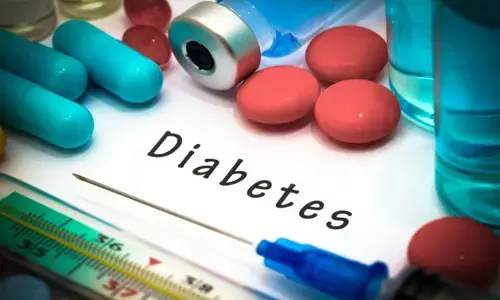- Home
- Medical news & Guidelines
- Anesthesiology
- Cardiology and CTVS
- Critical Care
- Dentistry
- Dermatology
- Diabetes and Endocrinology
- ENT
- Gastroenterology
- Medicine
- Nephrology
- Neurology
- Obstretics-Gynaecology
- Oncology
- Ophthalmology
- Orthopaedics
- Pediatrics-Neonatology
- Psychiatry
- Pulmonology
- Radiology
- Surgery
- Urology
- Laboratory Medicine
- Diet
- Nursing
- Paramedical
- Physiotherapy
- Health news
- Fact Check
- Bone Health Fact Check
- Brain Health Fact Check
- Cancer Related Fact Check
- Child Care Fact Check
- Dental and oral health fact check
- Diabetes and metabolic health fact check
- Diet and Nutrition Fact Check
- Eye and ENT Care Fact Check
- Fitness fact check
- Gut health fact check
- Heart health fact check
- Kidney health fact check
- Medical education fact check
- Men's health fact check
- Respiratory fact check
- Skin and hair care fact check
- Vaccine and Immunization fact check
- Women's health fact check
- AYUSH
- State News
- Andaman and Nicobar Islands
- Andhra Pradesh
- Arunachal Pradesh
- Assam
- Bihar
- Chandigarh
- Chattisgarh
- Dadra and Nagar Haveli
- Daman and Diu
- Delhi
- Goa
- Gujarat
- Haryana
- Himachal Pradesh
- Jammu & Kashmir
- Jharkhand
- Karnataka
- Kerala
- Ladakh
- Lakshadweep
- Madhya Pradesh
- Maharashtra
- Manipur
- Meghalaya
- Mizoram
- Nagaland
- Odisha
- Puducherry
- Punjab
- Rajasthan
- Sikkim
- Tamil Nadu
- Telangana
- Tripura
- Uttar Pradesh
- Uttrakhand
- West Bengal
- Medical Education
- Industry
Inpatient Diabetes management during COVID19 pandemic- ABCD guidance

The Association of British Clinical Diabetologists has released guidance on management of Inpatient Diabetics during COVID19 .
This is important in view of the fact that COVID-19 disease in hospitalized patients with diagnosed or previously unrecognized diabetes increases risks for emergency states of hyperglycemia with ketones, diabetic ketoacidosis (DKA), and hyperosmolar hyperglycemic state.
Therefore adjustments to standard diabetes management protocols may be required.In event of diabetes with Covid 19 infection, clinicians should contact a diabetes specialist team if available.
Key recommendations-
1.Blood glucose should be measured in all newly admitted patients with COVID-19 and ketones in all with known diabetes or admission glucose >12 mmol/L. However one must keep in mind that shortness of breath can also result from metabolic acidosis.
2.Stop sodium glucose co-transporter 2 inhibitors (SGLT2is) in all admitted patients.It may be noted that the glucose can be <11 mmol/L if patient is on SGLT2i, is pregnant, and/or has severe COVID-19.
3.After restoring circulating fluid volume, fluid replacement rate may need adjustment if there is evidence of "lung leak" or myocarditis.
4.If infusion pumps are unavailable for insulin drip, use alternative subcutaneous regimens to manage hyperglycemia, DKA.
5.Some patients may require extremely high insulin doses, with paradoxical hypoglycemia risk.
6.Never stop basal insulin in individuals with type 1 diabetes.
7.Patients who are very sick or not eating should have a Variable Rate Intravenous Insulin Infusion
(VRIII/'sliding scale'), with usual basal subcutaneous (SC) insulin continued alongside
8.If an infusion pump is not available for IV insulin, contact diabetes team or follow local protocols for an alternative subcutaneous regimen
INSULIN ADVICE – ALWAYS ASK IF YOUR PATIENT IS ON INSULIN
9.If patients are unable to manage their personal insulin pump and no specialist advice is immediately available, start a
VRIII or S/C basal-bolus insulin regimen then remove the pump and store it safely. If S/C regime required and not able to find out total daily insulin dose from pump then the following would be safe: calculate total daily insulin dose using 0.5 units/kg and give half the total dose as basal/background insulin and half as bolus/mealtime rapid acting insulin.+sure that pump is disconnected AFTER S/C basal insulin given.
10.Continuous glucose monitors (CGM) and Freestyle Libre (FSL) devices can be left on the patient but conventional capillary glucose monitoring will still be necessary
11. For imaging, insulin pumps, Continuous Glucose Monitors (CGM) and FreeStyle Libre (FSL) devices need to be removed for magnetic scans such as MRI
12.Always exclude acute foot infection/critical limb ischemia.
For further reference log on to:
Concise Advice on Inpatient Diabetes during COVID19 - Front door guidance. Association of British Clinical Diabetologists. 2020 April 9. https://abcd.care/resource/concise-advice-inpatient-diabetes-during-covid19-front-door-guidance
Dr Kamal Kant Kohli-MBBS, DTCD- a chest specialist with more than 30 years of practice and a flair for writing clinical articles, Dr Kamal Kant Kohli joined Medical Dialogues as a Chief Editor of Medical News. Besides writing articles, as an editor, he proofreads and verifies all the medical content published on Medical Dialogues including those coming from journals, studies,medical conferences,guidelines etc. Email: drkohli@medicaldialogues.in. Contact no. 011-43720751


